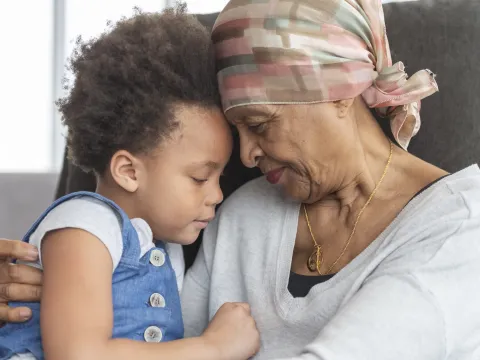- AdventHealth

If you chat with Mark A. Socinski, MD, thoracic medical oncologist who specializes in treating patients with lung cancer, he'll tell one of the most exciting days in lung cancer was Oct. 9, 2016, at the European Society for Medical Oncology conference. Dr. Socinski's also the executive medical director of the AdventHealth Cancer Institute.
We had a session where four major clinical trials were presented in lung cancer evaluating the role immunotherapy plays in treating lung cancer, he says. That session created such optimism about the future of therapy for advanced lung cancer in terms of how we select patients for certain treatments, when we use certain treatments and how we combine certain treatments.
And more good news: Dr. Socinski says that almost every lung cancer patient could be a candidate for immunotherapy. As long as they don't have a contraindication (a situation where a therapy, surgery or other procedure shouldn't be used because it could be harmful to an individual) for the use of immunotherapy like an auto-immune disease that would cause problems if you used immunotherapy.
In fact, we now have evidence in selected patients that immunotherapy is superior to chemotherapy, he adds. And that's where all the excitement is.
How did this come about?
In the 1990s, researchers discovered that cancer cells carried certain proteins on the surface that enabled them to escape attack from the body's immune system.
Known as PD-1, this allowed the cancer to suppress the immune system and to live and multiply without any interference from the immune system.
So what is immunotherapy?
Immunotherapy harnesses your body's own immune system to fight diseases, in this case cancer. And, unlike chemotherapy, which kills cancerous cells, immunotherapy acts on the cells of your immune system, to attack the cancer. This can be done in a couple of ways:
By stimulating your own immune system to work harder or smarter
Providing your immune system with components, such as man-made immune system proteins
All that said, you may be wondering how this treatment works.
With immunotherapy, patients are given an IV, he says. The way it works is that there is a PD1 receptor. People call it the brakes of the immune system. So if you push the brakes, what happens? You stop. And so the immune system stops. If you have a treatment that releases the brakes, the immune system can go back to work, recognize the cancer and destroy it. Antibodies to both PD-1 and PD-L1 (the ligand that binds to PD-1) have been developed
PD-1 vs. PD-L1?
If you want another explanation, the PD-1 receptor also called the programmed cell death protein 1 is a checkpoint protein that keeps your immune system from attacking normal cells in your body. Finding a way to block PD-L1 from binding to PD-1 and silencing the immune system has been of intense interest. Anti-PD-1 as well as anti-PD-L1 antibodies have been developed and work to release the brakes the cancer puts on the immune system thus stopping the cancerous cells in their track.
It's appealing to many patients because its like holistic medicine, he explains. You're engaging your own immune system. You're using a therapy that doesn't have much in the way of side effects.
Are there side effects?
Ninety to 95 percent of patients tolerate these immunotherapies almost like you're giving them a saline IV, Dr. Socinski says. In 5 to 10 percent of patients, there can be adverse effects. It's almost like an auto-immune disease.
The most common side effects are diarrhea, skin rash, thyroiditis, lung inflammation, encephalitis and kidney injury, he says. Pretty much anything that ends in -itis.
Continued optimism
For those who have been diagnosed with lung cancer, Dr. Socinski has many words of encouragement. The number of options for treatment has greatly expanded over the past decade, he says. We have a better understanding of the biology of lung cancer now. We have everything from oral therapies to immunotherapies to chemotherapy that can help you. You just need to get to a doctor who understands this.
I've been studying lung cancer for 25 years, and I know we still have a long way to go, but the outlook should be much more optimistic about being appropriately aggressive. It's really the job of every oncologist to know all this stuff. To get the right therapy to the right patient at the right time.
Dr. Socinski recommends having patients see a doctor who specializes in their specific disease.
If I need my brakes fixed, I want to go to the guy who specializes in brakes, he says. And if I have lung cancer, I want to see a doctor who is focused on lung cancer alone either in consultation with your oncologist or as your primary oncologist.
Available Immunotherapy Medications
There are three drugs available: Keytruda, Opdivo and Tecentriq.
If you have a high expression of PD-L1, we've found that immunotherapy with a drug called Keytruda is superior to traditional chemotherapy, which we've used for decades.
How many newly diagnosed patients have a high expression of PD-L1?
Its probably in the 20 percent range, he says. So this is not a treatment for everybody. In 20 percent of patients, it should be the first treatment, but in the other 80 percent, assuming you don't have a contraindication, they should get it after chemotherapy.
Here's a quick example: If you've just been diagnosed with lung cancer, and you have stage 4, the standard of care is to test it for PD-L1. Again, PD1 is the receptor that PDL-1 binds to. So if your cancer has a high expression of PD-L1, its using PD-L1 binding to silence the immune cells.
But at the end of the day, no one is ready to throw away chemotherapy.
Because it might be that these immunotherapy agents added to chemotherapy, Dr. Socinski explains. For most patients the issue is how can we maximize the impact of immunotherapy with our current therapies?
Although there aren't any definitive trials yet that answer this question, most of us are optimistic that were just beginning to figure out how to do all of this to the betterment of our patients.
Which types of cancer are treated with immunotherapy?
Not only is it beneficial for lung-cancer patients, but there's a growing list of immunotherapy treatments used for other cancers like melanoma, Hodgkin's disease and cancers of the kidney, bladder and head and neck cancer.



